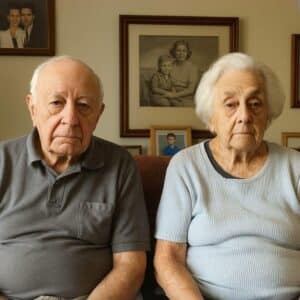The morning sunlight spilled across the cracked pavement of Winslow Elementary, casting long, golden shadows that danced between faded hopscotch lines and rusted bicycle racks. Inside, the hallway buzzed with the same Monday chatter—lunch trades, weekend gossip, and talk of the upcoming Talent Week. But in a quiet corner by the trophy case, one girl stood completely still, her hand clenched tightly around a piece of folded paper.
Her name was Sophie Lane.
To most students, she was just the girl with the patched shoes and secondhand backpack. The one who never raised her hand in class. The one who always ate lunch alone by the gym doors, her eyes fixed on the notebook she never let anyone read.
That day, something was different about her. She didn’t look taller or louder or suddenly popular. But her gaze—usually soft and distant—now held a quiet fire, like someone who had made a decision no one else knew about.
She looked at the list pinned outside the office. A long row of names: dancers, magicians, kids with karaoke tracks on USBs. And at the very bottom, she added her own. In careful, slanted letters:
“Sophie Lane – Singing (a cappella)”
Somewhere down the hall, laughter erupted.
“Wait, what? Sophie Lane? Singing?”
“Bet she’s gonna meow the lyrics. Or maybe rap with a mop!”
“Someone record it—this is gonna be gold.”
The jokes flew faster than paper planes. But Sophie didn’t flinch. She walked away, silent, her cheeks warm—but her fingers still gripping the notebook with lyrics written in pencil, faded from being traced over so many times.
That night, her mother found her in their small trailer bedroom, sitting cross-legged on a mattress barely wide enough for two. A cassette player hummed a lullaby in the background. Sophie was mouthing the words, quietly, her voice barely above a whisper.
Her mother didn’t interrupt.
She just listened.
Later, as the wind tapped gently at the windowpane, her mother spoke without turning on the light.
“You know, sweetheart… when I was your age, I wanted to sing too. But I was too scared. Too poor. Too everything.”
Sophie whispered, “I’m scared too.”
Her mother replied, “Then maybe it’s time someone sang anyway.”
No one at school knew what Sophie had been through—nights without power, mornings cleaning flour from bakery floors before sunrise. They didn’t see her rehearse under streetlamps when the house was too noisy. They didn’t know the story behind the song she chose.
But they were about to hear it.
And when that moment came—when a girl no one noticed stepped alone onto the school stage, without music, without backup, just a breath and a voice—the room would fall into a silence so deep, even the clocks seemed to pause….
Sophie drifted onto the stage the following Friday like a single autumn leaf settling where no one expected it. The auditorium lights were half-bright—just enough for the restless crowd of fifth- and sixth-graders to smirk, whisper, and raise their phones.
Her patched sneakers stopped precisely on the taped X. From the wings, the faculty sponsor leaned toward the sound booth.
“No backing track?” the tech whispered.
“She said none,” the sponsor replied, puzzled.
Sophie closed her eyes, notebook clasped in front of her chest. For one pulsing second, the hush felt like a dare.
Then she sang.
It began as the thinnest thread of sound, almost fragile—an old Appalachian lullaby she’d found on a library cassette, the same one that crackled under her pillow at night. But the note didn’t waver. It stretched, gathered strength, and rose, filling every dusty corner of the auditorium with something bright and startlingly pure.
Rows of students froze mid-snicker. Phones lowered. Even the vice-principal, who’d been scanning disciplinary reports, looked up and forgot what page he was on.
Sophie’s voice climbed a second register—clear as glass, but edged with the ache of someone who had seen winter mornings before dawn and heard her mother cry softly over unpaid bills. She sang of rivers that never judge a traveler’s ragged shoes, of cedar trees that keep secrets safe, of finding grace in the dark. Without accompaniment, the melody felt older than the school itself, older than the town.
By the chorus, nothing existed but sound and heartbeat. A teacher standing near the exit realized she was squeezing a hall pass so tight her knuckles had gone white. In the front row, Jamal—star of last year’s rap duo—blinked fast, throat bobbing. The two boys who’d joked about “meowing lyrics” shifted uncomfortably, unable to meet each other’s eyes.
Sophie opened her gaze to the spotlight. It caught tears she hadn’t known were there, and the tears gleamed like tiny embers. She almost faltered—almost—but her mother’s words drifted in: Then maybe it’s time someone sang anyway. So Sophie let the final note swell past fear, past hunger, past every time her patched shoes had been laughed at, until it hovered in the rafters like a prayer.
Silence followed. Thick, absolute.
And then the room erupted.
Not polite applause. Roars. Chairs scraped backward as kids leapt to their feet. Someone in the back whistled. The drama teacher clapped both hands over her mouth, eyes shining. Even the principal, a man rumored to have once fallen asleep during a visiting orchestra, stood applauding.
Sophie blinked at the sea of hands and faces. For a heartbeat she looked ten again, wide-eyed at her first snowfall. Then she bobbed a small curtsy—the kind her mother had shown her as a joke while folding laundry—and hurried offstage.
Backstage chaos swirled: kids congratulating, teachers exclaiming. Yet the moment she stepped into the wings, she felt a gentle squeeze on her shoulders. Her mother, allowed into school early to help collect props, had watched from the side curtain. Tears shimmered on her cheeks. She said just one word: “See?”
• • •
The video reached a thousand views before dinner. By midnight, thirty thousand. Local radio DJs replayed the audio Monday morning; a folk-music blogger called it “ghost-honest.” Labels emailed the school asking if Sophie had representation. She didn’t know what representation meant.
Tuesday, the principal announced an assembly “celebrating exceptional student talent.” Sophie tried to sink into her seat, but her peers pointed her out like she was already a legend carved into the trophy case glass.
Afterward, as the hallway emptied, Jamal approached. He kicked the floor, voice low. “I, uh… said some dumb stuff last week. Your song—my little sister watched it on loop. Says it makes her heart float. So… sorry. And thank you.”
Sophie nodded, words tangled behind her smile. The apology, she realized, mattered almost as much as the applause.
• • •
Opportunities snowballed: a scholarship to the state summer arts program; a slot at the county fair; free singing lessons from Mrs. Ortega, the retired choir director who’d once toured Europe. Each form arrived with neat lines for parent signatures and a little box marked Why this student? Sophie found herself writing the same sentence again and again: Because I finally sang.
Life at the trailer didn’t transform overnight—rent still bit hard, and the power still flickered when storms rattled the hills—but the evenings felt lighter. Sometimes Sophie and her mother practiced harmonies in the kitchen while a single pot of soup simmered. Once in a while the neighbor’s porch light blinked off so they could finish a run-through without the glare.
One crisp evening in May, Winslow Elementary held its first outdoor concert under fairy lights strung across the playground. Parents bundled in blankets; kids balanced hot cocoa between mittened hands. When Sophie walked onstage, she spotted two rows of her classmates wearing paper stars they’d cut out in art class. Each star bore a single hand-written word: Believe.
She sang a new piece that night—part lullaby, part promise. As her final note drifted into the spring air, she pictured every cracked pavement and faded hopscotch square filled with something growing: courage in the quiet corners, music where no one expected it.
The applause felt like wind beneath wings she hadn’t known she possessed.
And somewhere in that flutter of claps and cheers, Sophie Lane—once just the girl with patched shoes—understood that voices aren’t measured by who mocks them first, but by who listens when they finally rise.





